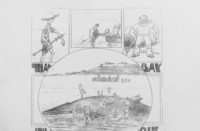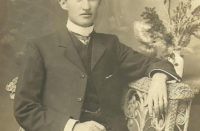Dis and Dat, or Dut un Dat
‘Unlike the flighty Pommeranians, the old Uckermarkers, they were very solid. Yes, nothing changed with them. Everyting was d’ same, dey hardly talked very much and vhen dey did dey talked like dat you know dey never said much you know. Yes, long silences, while dey sucked on d’ pipe and I’ll never forget this one time …
‘One day Onkel Harry und Onkel Jack und Onkel Ernst were all sitting on the verandah like tree alt crows on der railing, you know, all sitting dere. In d’ chair witt de pipes. Just sort of lookin out into de paddock und … I forget which one said … Uncle Jack … ‘Might rrrain’. After a while Uncle Harry said, “Won’t rrrain’ (pause). And Uncle Jack said, ‘I tink it vill, (pause), ‘ Then after a while Uncle Ernst got up and he started to go inside and he said, “Where are you goin’ Ernst?”, and he said, “Well I komm out here for a bit of peace and quiet”, he said, “I didn’t komm here to hear bleddy arguments yet”.’
(Compare the story above with one given of a website of north German ‘Plattduutsch’ language and culture (called ‘Dut un’ Dat’). The joke is about three north German fishermen sitting in a pub in front of their “Bier und an Kom” (Beer and Kummel Schnaps) smoking their “Pieps” (pipes). After one hour silence one fisherman sighs, “Jo, Jo” (Yes, Yes). Another hour passes by and again, “Jo, Jo”. Two hours later the same fisherman says, “Jo, Jo! I got to go!, gets up and leaves. One of the remaining people says, “Hein, is’cha man n’ fein’ Kerl, bat he snackt to feel” (Hein [the man who left] is a fine mate, but he talks too much) and all nod in agreement.
See how similar!
Lockyer ‘Deutsch’
Through the wonderful writings of South Australian author Colin Thiele, the remnants of the unique ‘Barossa Deutsch’ language of the German settlers in South Australia has reached the general public. Consisting of an amalgam of both English and German words – often spoken in German grammatical structure – this language often persisted into a number of generations and older folk in the Barossa region can still speak it today. Some call this language ‘gemixt’.
What is little known is that southern Queensland, and particularly the German ‘heartland’, the Lockyer and Fassifern Valleys, had a similar ‘broken English’ language, spoken with a pronounced heavy German accent. Known as ‘Lockyer German’ some of the typical sayings, phrases and usage patterns are given below. many years ago University of Southern Queensland academic researcher Rod Wilson made a detailed PhD study of the Lockyer Valley German language and its usage, persistence and change. Details of his thesis are given in the Resources section
SOME ‘TYPICAL GERMAN WORDS & SAYINGS’
And they used to say things like, ‘I’ll stay by the house all day’. Well in German language that’s what you would say: you stay home – stay by the house. Another good one was, ‘Oh Vater vhen he tells a story he’s got to go all through Berlin first”, meaning it takes a person a long time, and a lot of words, to get to the point!
(from Les Moreland, Kenilworth)
‘Pop’ Wernowski, when walking down the main street of Boonah, the unofficial capital of the Fassifern, would say on meeting an acquaintance: ‘How you vos?’, to which the answer would be, ‘I vos allright’.
Another saying the old folk had was, ‘I’ll stay by the house all day’ – meaning, literally, that they would stay home all day.
If anyone had itches on them they had Eganutz. If they had aches and pains they had Hexamschuz. Anyone with bunions on their feet had Knuders. If they were nervous they had Vrubblic. If two of the family had an argument they had a Lieberyacht. Anyone who was old usually ended up Stachalich. If you wore spectacles you wore Brieller. Any small child was a little Schnirper. Any hot day was usually spent on the Lunker (covered walkway connecting the kitchen to the house) in the shade. If you got drunk you ended up Besaupic. When machinery was worn out it was Yachilecht. If a cow pushed a fence over she made the fence Schreched. If you over-ate you ended up with Zauerbrandt. If any of the lads made too much noise they were called Vildevalts. Any crop that failed due to dry weather was Forschrorben. To get the cows where you wanted them you had to Enviegel them. To plane wood it had to be Shrauped. An insect was known as a Fimfumnootenkerter. A sick chicken was Peepic.
(all of the above saying come from Minden farmer and avid local historian Norm Zabel, who recorded these in the history, ‘Zabel Family 1870 – 1985’).
Photograph depicts the breezeway or walkway, known in the Lockyer as the ‘Lunker’, connecting the kitchen to the main section of the early slab house.
Just to the north of Toowoomba lies the old German farming community of Highfields where I recently spoke to Mr Ken Graf about both pigs and Germanisms. Ken told me his great grandfather called the ‘blacks’ (Aboriginal people) in the region, or those then remaining, Schwarzendivils (black devils). In the village of Goombungee which is a half hour drive northwest of Toowoomba some fascinating ‘regional’ Germanisms have either persisted, or have been more recently developed! Walk in to the Pioneers’ Arms Hotel in Mocatta Street, the main thoroughfare, and order a ‘zoog’ and they’ll give you one – a large glass of fortified wine (sherry or port). Yet 40 kilometres away in the metropolis of Toowoomba the publicans won’t know what you mean. Other favourite ‘German’ attributed expressions in Goombungee and surrounds include that of ‘preudler’ – meaning a hopeless person, and ‘boergler’ – a really hopeless person who was unfit to perform even simple (farm) tasks. A ‘dummer’ is a term for those who are considered quite simple and have trouble with most daily issues. Other Aussie farming terms have also invaded local German-Queensland vernacular – for instance, you’ll often hear: ‘he’s as thick as a barn door!’
Peter (Percy) Vonhoff of Plainby, northwest of Goombungee on the Darling Downs, brings out the ‘zoog’ barrel for a few sips before a solid session of German-Queensland music. Even the zoog barrel is of German origins – having been recently made and purchased from Schmeider’s Cooperage at Bundaberg!




My late Father had befriended a well educated German engineer who had imigrated post ww2, spoke excellent English, and did not believe that any German would speak in the manner my Father described. Eventually Host and his family accomanied our family to vist my Uncle at Jandowie. All the males slept in the large garage and we were awakened by the voice of a lady driving a herd of milking cows along the road My uncle conversed at lenght with ease in the same manner as the woman of obvious German descent. Horst stood in absolute silence of stunned disbelief as his face registered recognition of the unmistaken origin of the language ringing clearly in the early morning air.
Years later I understood perfectly when a Lowood district resident commented thus:- “I vas standing side by each togedder mit the prickly vire fenc when the bloody big black snake she walk me by.
Gotta Love those German settlers.
Try the clone stamp tool. You can clone away anyone you don’t want in a photo, for ono.Yeu can get some really cool effects with masks, too.